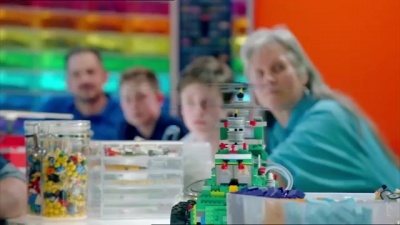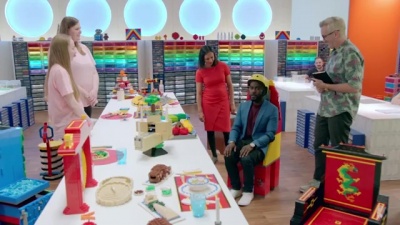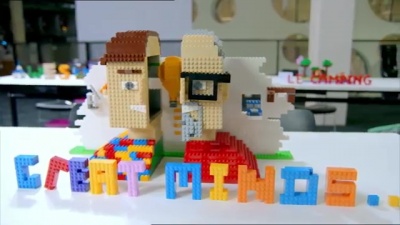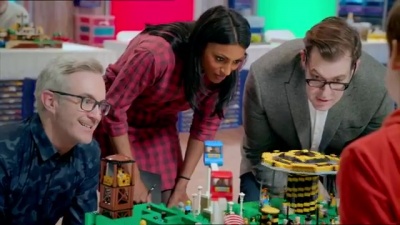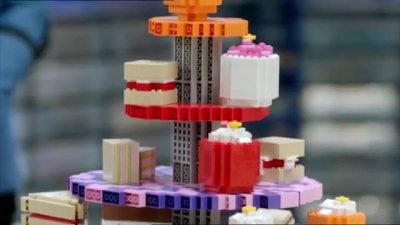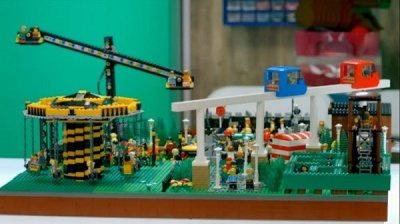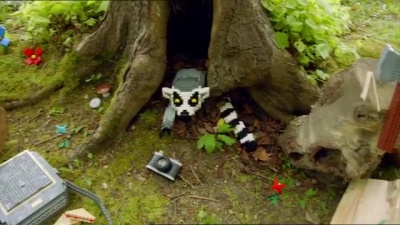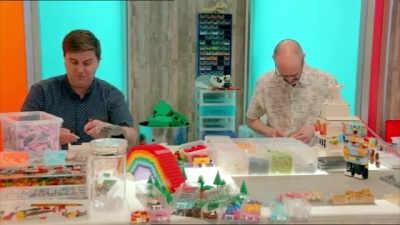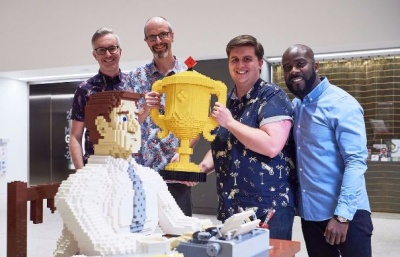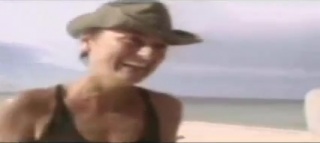Weaver's Week 2017-09-17
Last week | Weaver's Week Index | Next week
Where's Peter Baynham when we need him?
Contents |
Lego Masters
Tuesday's Child East for Channel 4, 24 August – 14 September
A note on style. We're not going to avoid the commercial reference, we can't call this "Construction Brick Masters" or "Ow that little piece of plastic I've trodden on is painful Masters". This is a Lego show, and we're going to associate it with the Lego company – for good and ill.
The contest structure is the familiar "musical chairs" form. Lots of people audition in the first episode, a handful make it to the main contest. Over a number of weeks, eight become six become five become three for the final. Prior work doesn't count, only the performance in that week's challenge.
But no-one's watching for the minutiae of contest rules. We're watching for the minutiae of life.
The Hitch-Hiker's Guide to the Galaxy defines Lego as "a toy for children of all ages, consisting mainly of small plastic bricks cunningly designed so that they stick together." Out of these small bricks, it's possible to create all sorts of fantastic objects. Animals, chairs, food, cars, fairground rides, even inedible food.
After they covered the auditions in ten minutes, episode 1 was themed around a banquet in the mediaeval zone. The pairs had fourteen hours to make their masterpieces, and they'd been given advance notice of the theme. Not only were they to make food out of Lego bricks, but they were to make a throne to support the weight of a fully-grown man.
The producers could have spent half-an-hour showing people fitting bricks into other bricks, but that makes for dull television and we're glad they didn't. Instead, the footage concentrated on the design process. Explain what you're going to do, perhaps with some sketch drawings, then go off and do it. Then find some problems, refine the design to overcome them.
Tomorrow's Star Melvin Odoom hosted. He was the "fully-grown man" who would sit on the throne and become king – or come crashing down to earth in a pile of ill-joined plastic. Melvin was a functional host, overshadowed by the knowledge of guest judges. He didn't impose his stamp on the programme, he didn't stand in the way of the contestants' personalities.
Ah, the contestants. All ages auditioned for this show, and the eventual contestants spanned a reasonable age. A couple of pairs of young lads, some recent graduates, some more experienced teams, some family pairs. We don't think there were any OAP finalists, but we stand to be corrected.
All of this helps to advance the Lego company's agenda, that it's a product for all ages. It also makes for unusual television. Given the wide variety of ages, we're going to see adults criticising the work of young children. That's an unusual sight, and a poor power balance. It can be done, and needs to be handled with great sensitivity.
In this column's view, Lego Masters did their young competitors right – honest and constructive feedback they can use in the future. The critique wasn't spared, nor was it overpowering. Other viewers found it uncomfortable viewing, and we can see that any adult telling children about flaws in their work could be painful.
Matthew Ashton from the Lego company was the permanent judge. Others rotated in and out – the opening week had Roma Agrawal, a structural engineer. This made for dry television, accurate but uninspiring. Some stardust came in later shows, courtesy of Richard Osman, Bill Bailey, and Dara Ó Briain.
But that judging – and the demonstrations of how the models actually worked – came at the end of the show. The bit in the middle, the construction phase, will make or break the programme. We had a good idea of what each team wanted to achieve, that was made clear early in the build phase. And we were able to see how they were going to achieve it, what techniques and what ideas they'd use. Filmed cutaways explained some of the less obvious ideas, and demonstrated the abilities of Lego products.
With many hours of footage available, the producers could tell the story they wanted. They wanted to tell a story about the design process, so that's what we saw. If they wanted to tell a story about precision and detail, they could have told that – and it's a slight shame that we never got to see a speeded-up version of a large model being built.
The producers also wanted to explore the relationships within the pairs. Have you got an overbearing mother? Or a forgetful best friend? Are you going to do the boring work while your co-worker does the technical fiddly bits and connects the oojamaflap to the wotsithingy? This aspect tended to be low-friction, gentle disagreements and not any sort of actual bad feeling. The Lego company don't want to be associated with bad feeling.
As seems to be common on long projects like this, we never got a good sense of time – Melvin's time-checks and some clock shots added in post-production were all we saw. The timelessness wasn't helped by the studio being in bright colours. Scrapheap Challenge (a clear ancestor of this show) solved the time problem by working outdoors, naturally going from midday to evening.
After the first week's simple brick 'n' stick models, later shows introduced other ideas. Moving parts arrived in episode 2, as did the Unplanned Build. The contestants were surprised with the first task, make a vehicle of the type written on card. "Design briefs can change," shouted Melvin part-way through, telling the teams to rotate their card around the room. No, not buying that. It's a gratuitous rule change, introduced to confect false drama, it insults both competitor and viewer. We hoped such nonsense had been left on Scorpion Island.
Another unplanned build started week 3, making miniaturised creatures out of no more than 15 bricks. Again, we lost all sense of time in this challenge – did the players have two minutes, twenty minutes, two hours? This is an exercise an interested viewer could replicate at home: build a bee using so few bricks.
The planned build was to be completed outdoors, so some time had to be allocated to packing up the part-built pieces. Plenty of bubble wrap and stout cardboard boxes. We've a quibble about one of the judges' comments – a squirrel was criticised as looking "robotic". Every artwork made out of Lego looks robotic, that's the company's unique selling point (and a plot point in The Lego Movie).
This week's final spent half the time on a spontaneous build, bringing children's imagination to life. The brief had been nebulous, and the time tight. Children explained their dreams in childish words, and were disappointed that the sketch constructions weren't all-singing all-dancing manifestations that included every detail they'd dreamed and not verbalised. Some comments from sole judge Matthew Ashton felt unreasonably sharp, and we didn't see a compelling reason why he invited the team to leave.
Was this included to advance the Lego company's image? They would like people to think of Lego as a home for imagination as much as it's a home for technical competence. Whether they promoted that view at the expense of the competition is a question for viewers.
The second half was an epic build. Here, we think the format sold our finalists short – a whole week's construction was summarised into little more than a quarter hour. The complexities, the little hidden features, were all covered in a few moments. These magnificent creations deserved a proper examination, and didn't get it. Might they have merged two episodes together because one (or both) of the final challenges was a bit underwhelming?
Taken as a series, we found Lego Masters to be a bit too blokey. If we remember correctly, there was just one woman competitor after the opening week, and only one woman on the combined judging panels. Is the Lego company committed to equality between genders, and is a male-dominated competition the best way of demonstrating so?
It's always fun to see the finished designs, though we never quite got into the design flow as the competitors did. A lot of time was snipped out of the builds, and our attention was diverted by commercials. The judges made decisions we can understand, which is not always true of arts competitions. While the series corresponded with Lego's corporate image, it wasn't preachy, we were never told what to think.
Overall, though, we found something was lacking in Lego Masters. It's a sit-back programme, one where we can gawp at other people being brilliant. It's not a lean-forward programme, it didn't inspire us to creative ideas. For what was (in effect) an advert for a creative company's products, that's a sizeable omission.
Countdown Update
Episode 6666 of Countdown went out this week, a fact not noted on the show. Nor do we think they'll be doing anything to mark their 35th anniversary in November.
When we last looked at this saga, Michael Pfeffer was in the champion's chair. He won eight heat games, and a total score of 770 made him third seed at the time. He's since been overtaken by Noel McIlvenny, with a total of 793. Between these players were champions Patrick Hopkins (1 win) and Sarah Capperauld (2 wins).
David McGaw looked strong in his three wins, but lost a tight match to Nikki Saarsteiner. How often have we written about a good player who fell just a little short against another good player? It happened to Nikki as well, four wins before she was unseated by Steve Anderson. He proved a one day wonder, losing to Sarah Holey (3 wins). Current champion Ben Leyburn (3 wins) looks promising, he kicked off with a pair of centuries.
This Week and Next
To mark the 35th series of CBS Survivor, Entertainment Weekly has a list of their favourite 35 moments.
What would be on our list for ITV's Survivor? They only made two series, so we only need to find two highlights.
1) The Amazing Standing On a Log Challenge. Stand on a log. Don't fall off the log. It's a very difficult task, just stand around on a log. They could do it all day. And they did it all day. They could do it all night. And they did it all night.
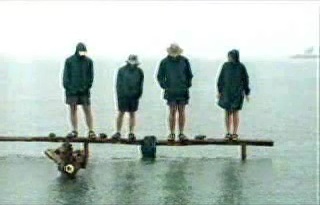 "Hour fourteen, and John, Jonny, Alistair and Drew are getting wet. Very wet. Because it's raining, and they're standing on a log."
"Hour fourteen, and John, Jonny, Alistair and Drew are getting wet. Very wet. Because it's raining, and they're standing on a log."
For the 2002 series, Jonny Gibb set the world record for standing on a log, 24 hours 6 minutes. He later won the top prize of One Million Pounds ........... Cash.
2) Zoe Lyons Gets a Tip. The waitress and drama school graduate learned something on the 2001 series. "I learnt that you can live on fish heads for ages, but you can't survive without good conversation. I was going bonkers." The show's producer Nigel Lythgoe had many years' experience in showbiz. He saw something in Zoe, and suggested stand-up comedy. She left it two years, long enough for almost everyone to forget about Survivor.
Over the years, Zoe has honed her craft, and has been rewarded with awards and regular work. Charismatic on stage, acerbic on panel shows, and (in this column's view) the breakthrough comedy star of the 21st century.
All-bloke teams are becoming rare on University Challenge. Good. They're even rarer, after Sheffield Hallam (Richard Simkins, Alex Crombie, Chris Doyle, James Hanson) lost to Newcastle (Jack Reynard, Molly Nielsen, Jonathan Noble, Adam Lowery). 40-170 the final score, and we must note that Sheffield Hallam failed to answer any of their bonus questions correctly.
Jonathan Frere won Mastermind, answering questions on Julius Caesar. He narrowly beat Matt Jackson (Lancashire cricket club), Alyx Weston (Green Wing), and Hammad Hassan (the poet Rumi). 22 was the winning score, a very respectable 17 for last place.
Over on Only Connect, the Wanderers: (John Payne, Sanjoy Sen, Richard Arthur, a team confected by the producers) beat the Pedagogues (James Manson, Jennifer Shearman, Megan Manson, related by blood and marriage). 26-19 the final score, both sides boosted by some less-demanding walls.
This week's show included an unconscious invitation for viewers to switch over, with all four hosts of The Crystal Maze pictured. "I didn't think you watched The Crystal Maze in New Zealand," said Victoria, padding the end of her sentence with precisely three words.
BARB ratings in the week to 3 September.
- The Grate Breadxit Burn-Off (C4, Tue) was the top show of all, seen by 8.7m people. Coronation Street (ITV, Wed, 7.3m) the top non-game.
- The X Factor also returned, top score on Sun with 7.25m. BBC1's top game was Celebrity Masterchef (Wed, 4.95m).
- Cannonball fired well for ITV (Sat, 3.2m). Dragons' Den (BBC2, Sun, 2.8m) and University Challenge (BBC2, Mon, 2.3m) sandwiched The Family Chase (ITV, Sat, 2.55m) and Tipping Point Lucky Stars (ITV, Sun, 2.55m).
- Less success for Lego Masters (C4, Thu, 1.9m), ahead of Extra Cake (C4, Thu, 1.75m). The Crystal Maze (C4, Fri, 1.25m) finishes well behind Only Connect (BBC2, Fri, 1.65m).
- In a very quiet week for digital channels, Coach Trip Road to Zante (E4, Wed, 370,000) beat off a Catsdown repeat (More4, Sun, 265,000) and Masterchef Australia (W, Mon, 265,000).
After last week's many new series, it's a bit quieter this week. Y Cwis Pop (R Cymru, Fri) the main new show. It's the final of Celebrity Masterchef (BBC1, Fri), and the last episodes of Cheap Cheap Cheap (C4) and Richard Osman's House of Games (BBC2). A new episode of Pointless Celebrities (BBC1) next Saturday.
Photo credits: Tuesday's Child East, Planet 24 / Carlton.
To have Weaver's Week emailed to you on publication day, receive our exclusive TV roundup of the game shows in the week ahead, and chat to other ukgameshows.com readers, sign up to our Yahoo! Group.

